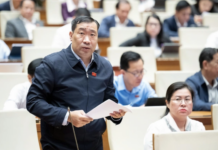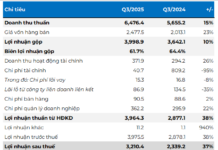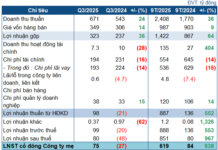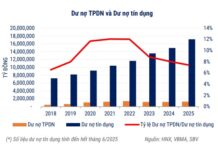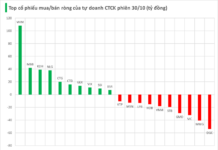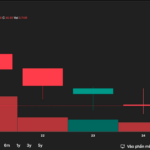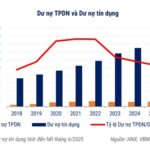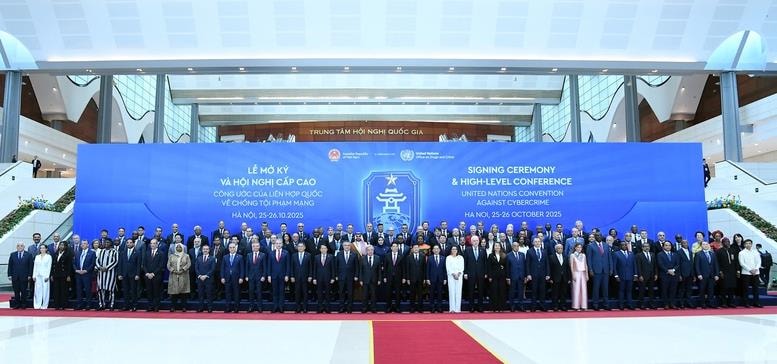
Today, October 25th, the Signing Ceremony of the United Nations Convention Against Cybercrime, themed “Combating Cybercrime – Sharing Responsibility – Shaping the Future,” took place in Hanoi. Photo: VGP
The event was attended by representatives from nearly 100 countries and over 100 international and regional organizations. President Luong Cuong chaired the Signing Ceremony alongside United Nations Secretary-General Antonio Guterres and numerous high-ranking leaders from various nations and international organizations.
Scheduled from October 25th to 26th, the program includes an opening and closing ceremony, a signing ceremony, and a high-level conference featuring one plenary discussion, one signing session, four high-level panel discussions, four roundtable exchanges, a gala dinner, and a technology exhibition jointly organized by the Vietnamese government and the United Nations Secretariat.
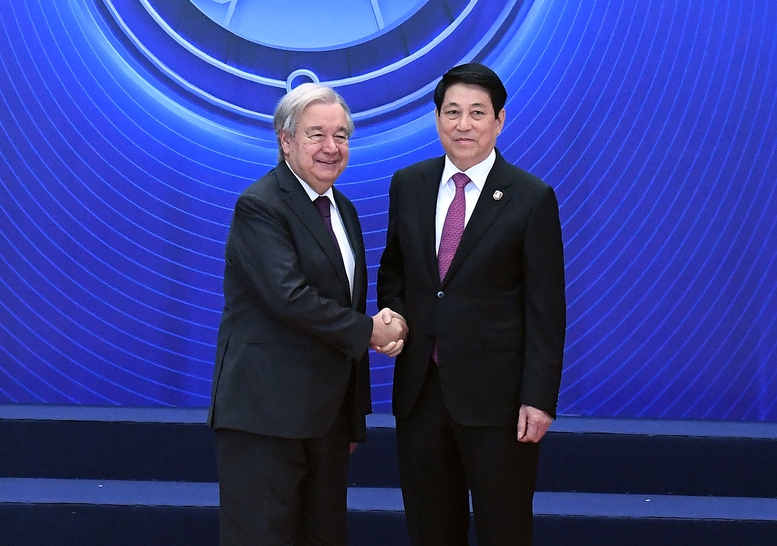
President Luong Cuong and UN Secretary-General Antonio Guterres at the Hanoi Signing Ceremony – Photo: VGP/Hai Minh
Vietnam’s Milestone and Opportunities
As a rapidly developing nation in digital technology, Vietnam keenly understands the challenges posed by cybercrime, from large-scale attacks to cross-border fraud. Over nearly five years of negotiations, Vietnam actively participated in eight sessions of the specialized committee, making substantial contributions to the convention’s content. Hosting the signing ceremony underscores Vietnam’s commitment to protecting cyber sovereignty and advancing global digital governance.
The convention, named the “Hanoi Convention,” and its selection for signing in Vietnam’s capital in October 2025, recognize Vietnam’s efforts. This marks the first time a Vietnamese location has been associated with a global multilateral treaty, signifying a pivotal moment in 47 years of partnership with the United Nations. This choice reflects Vietnam’s rising international stature and the global community’s trust in its leadership on cybersecurity issues.
Following eight formal negotiation sessions and five intersessional meetings spanning approximately 30 months (February 2022 to August 2024), the United Nations General Assembly officially adopted the Convention on December 24, 2024. The Convention is poised to become a “universal and comprehensive legal instrument” for all member states to collaborate in preventing and combating cybercrime.
Comprising nine chapters and 71 articles, the Convention was drafted over four years and addresses critical areas such as criminalizing cyber offenses, international cooperation mechanisms for investigation, extradition, sharing of electronic evidence, asset seizure, witness protection, and victim support.
The inclusion of the “Hanoi Convention” in the text of the Convention highlights Vietnam’s significant contributions to its development. Hosting the Signing Ceremony further underscores Vietnam’s commitment to enhancing its global standing, fulfilling its responsibilities, and promoting cybersecurity initiatives.
Vietnam’s Preparations
In preparation for the signing ceremony, Vietnam collaborated closely with the United Nations Office on Drugs and Crime (UNODC) and the United Nations Office of Legal Affairs (OLA). Activities such as the symposium in Vienna (March 2025) and the preparatory conference in Addis Ababa (April 2025) demonstrate Vietnam’s proactive efforts to promote the Convention and engage regions like Europe and Africa.
Beyond hosting the signing ceremony, Vietnam has planned panel discussions and events connecting governments, businesses, and international organizations to foster dialogue and cooperation. These efforts have garnered widespread support, affirming Vietnam’s role as a mediator in bridging legal systems and differing perspectives.
Vietnam has launched domestic initiatives such as the “National Cybersecurity Strategy to 2025, Vision to 2030,” enhancing its capacity to prevent and respond to cybercrime. These efforts aim to safeguard the domestic digital space and contribute to regional and international cooperation programs, particularly as global cybercrime damages are projected to reach $10.5 trillion by 2025.
Vietnam is also working to align its domestic legal framework with the Convention by reviewing and amending cybersecurity and data protection regulations. Investments in research, technology development, and high-quality workforce training are being accelerated to establish modern cybersecurity centers and early warning mechanisms. Additionally, Vietnam encourages private sector and civil society participation to raise public awareness and build societal consensus.
With a spirit of equal and transparent cooperation, Vietnam is committed to making the Hanoi Convention a groundbreaking tool in the fight against cybercrime. By bridging nations, promoting technology transfer, and fostering trust through fair oversight mechanisms, Vietnam is helping shape a secure cyberspace and cementing its role as a leader in global digital governance.
We extend our sincere gratitude to our partners Vietinbank, PETROVIETNAM, EVN, MB Bank, Agribank, SSI, FPT, VPBank, Gelex, Vietnam Airlines, VIX, BIDV, VIETTEL, and OKX for their support in the Signing Ceremony of the “United Nations Convention Against Cybercrime” – where commitments are transformed into action for a secure, progressive, and humane cyberspace.
Prime Minister: Streamlining Processes to Ensure Social Housing Projects Are Completed Within 2-3 Years
The Prime Minister emphasized the need to slash administrative procedures by at least 50%, categorizing social housing projects as “green lane” or “priority lane” initiatives to expedite processes and ensure timely implementation. Additionally, flexible methods should be employed to secure cleared land for social housing development, while diversifying funding sources to support its expansion.
Upcoming Launch: Online Registration System for Social Housing
At a conference chaired by Prime Minister Pham Minh Chinh on the morning of October 24th, several groundbreaking proposals were presented to revolutionize social housing initiatives. Among these, a standout suggestion was the development of an online registration system, designed to streamline access for citizens and significantly reduce the time required for application processing.







